J.J. Belanger
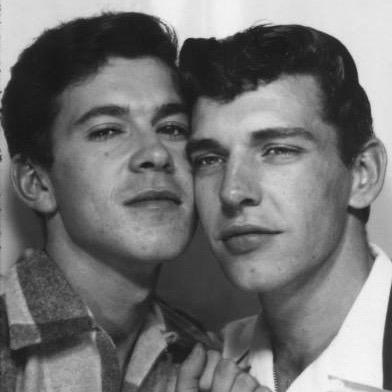 Robert Block (left) and J. J. Belanger in a photo booth photo (one of two), Hastings Park, Vancouver, Canada, 1953. Credit: Courtesy ONE Archives at the USC Libraries.
Robert Block (left) and J. J. Belanger in a photo booth photo (one of two), Hastings Park, Vancouver, Canada, 1953. Credit: Courtesy ONE Archives at the USC Libraries.Episode Notes
J.J. Belanger lived a big life. But if we remember him at all, it’s only because of two images from a photo booth photo taken in 1953. Yet J.J. had a big life that extended from the skies over Europe during World War II and the offices of the legendary Dr. Alfred Kinsey to trans rights activism before transgender rights were on anybody’s radar. To learn more about Joseph John Belanger, please explore the resources and links that follow below.
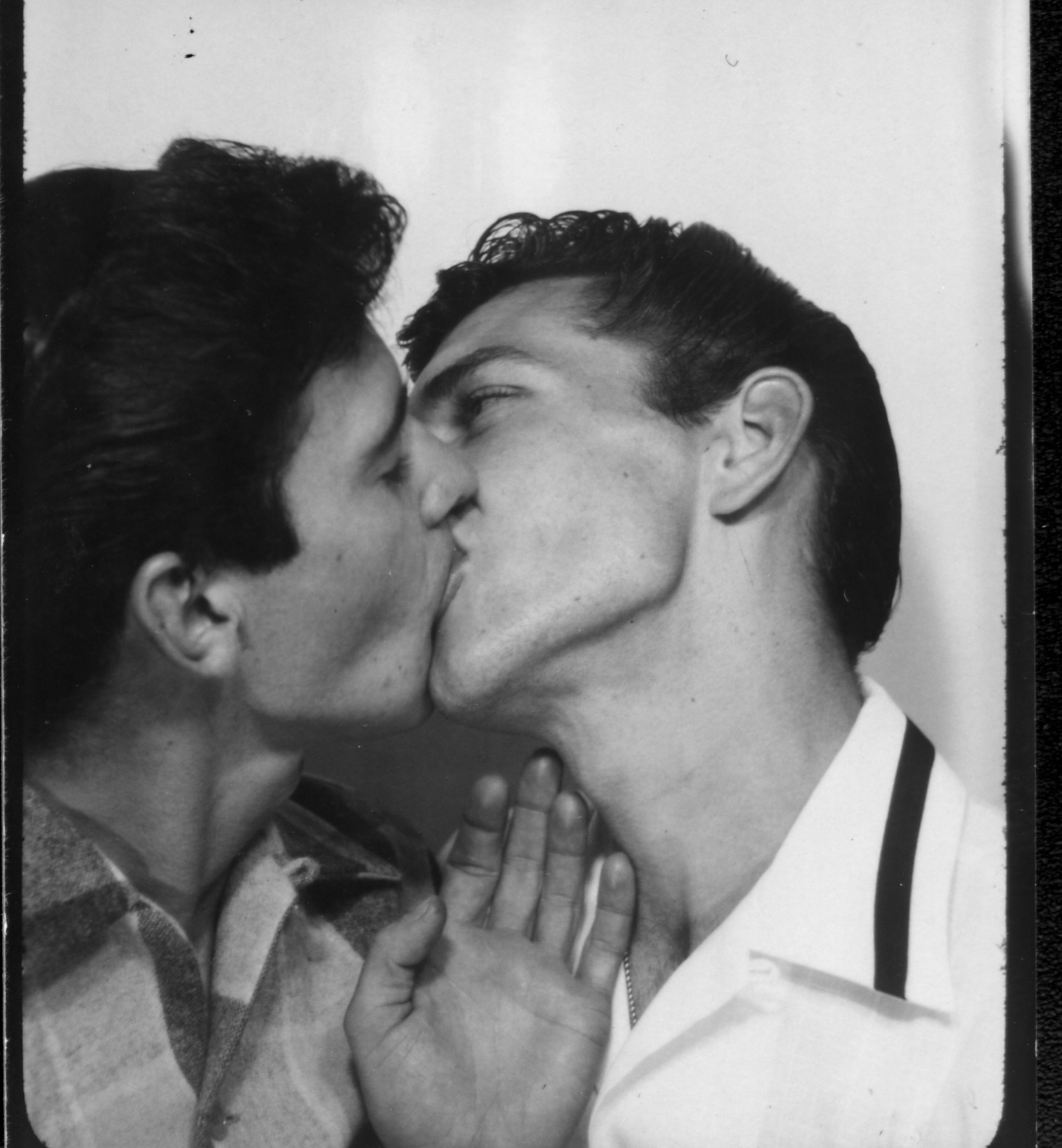
———
Joseph John Belanger was born on January 24, 1925, in Edmonton, Alberta, Canada. He died on January 26, 1993. For an overview of his life, have a look at this post on the Gay Influence blog.
Information about J.J. Belanger’s collected papers, as well as biographical information, can be found online and are a part of the ONE Archives at the USC Libraries. You can learn more about the ONE Archives and its history here.
The famous photo booth photo of J.J. Belanger was rediscovered in 2014 and spread quickly through popular media such as The Advocate, TIME, Queerty, and blogs. Psychologist Jason Mihalko collected a series of vintage photo booth photographs showing both friends and lovers, which you can find here.
J.J. Belanger makes reference in his Making Gay History interview to Psychopathia Sexualis by Dr. Richard Freiherr von Krafft-Ebing, which can be read here in a scanned version of the original book.
Anecdotes about working with Dr. Alfred Kinsey (aka, “Dr. Prometheus” and “Dr. Peter Meter,” according to J.J. Belanger) and his colleagues are included in a 2010 biography of Samuel M. Steward called Secret Historian: The Life and Times of Samuel Steward, Professor, Tattoo Artist, and Sexual Renegade by Justin Spring.
Dr. Alfred Kinsey authored two landmark books about sexuality: Sexual Behavior in the Human Male, which was published in 1948; and Sexual Behavior in the Human Female, which was published in 1953. On the 50th anniversary of the publication of Dr. Kinsey’s book about female sexuality, the Associated Press (via CBS News) wrote a reflection on the study’s impact, which you can read here.
The Kinsey Institute at Indiana University offers extensive information and research on human sexuality and gender.
A brief summary of Dr. Harry Benjamin’s (1885-1986) life and works can be found here. The website features documents and letters related to his pioneering research on transexuals. For further information about Dr. Benjamin, have a look at his biography. You can also read his New York Times obituary.
J.J. Belanger got involved with the Mattachine Society beginning in 1953. To learn more about the Mattachine Society, please have a listen to previous MGH episodes featuring Chuck Rowland and Hal Call. We also recommend our episode featuring Herb Selwyn.
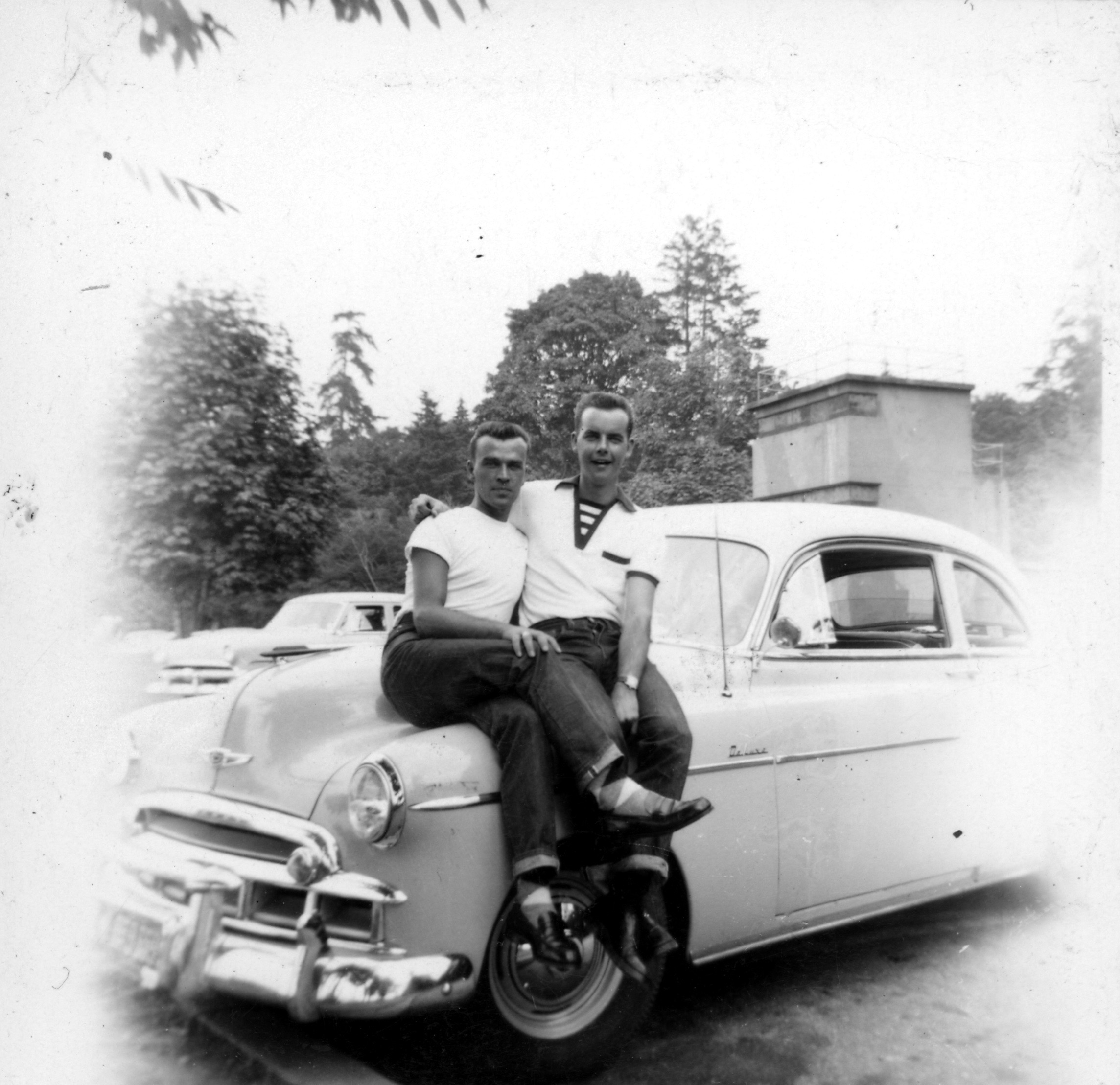
———
Episode Transcript
I’m Eric Marcus and this is Making Gay History!
I’d like to introduce you to J.J. Belanger. But before I do, I have a confession to make. One of the things we take pride in with Making Gay History is bringing long-lost or forgotten stories to life. J.J.’s story was one that even I had forgotten. When our executive producer, Sara Burningham, told me that she’d been listening to J.J.’s compelling interview in the Making Gay History archive, it didn’t ring a bell. Not even a little bell.
But then Sara mentioned a couple of famous black and white photo booth pictures of two men from the early 1950s and I knew exactly who she was talking about. And you may, too. In one of the photos, the handsome young men, each with his head pressed against the other, are looking directly into the camera’s lens. Both have faint, mischievous smiles on their lips. In the second photo, they’re kissing passionately—and given the times, defiantly. It was 1953 and the man on the right in the photos is 30-year-old J.J. Belanger.
1953 is also the year that J.J. joined the early gay rights group the Mattachine Society, arriving in Los Angeles to attend the organization’s heated constitutional convention that led to the founders being thrown out and a new regime, led by Hal Call, taking over. You can hear more about the Mattachine Society in two of our earlier episodes—one featuring Hal Call and the other, Chuck Rowland, who was one of the five original founders.
But the focus of this episode with J.J. Belanger isn’t on his involvement with Mattachine. We’re going further back in time to the 1930’s and ‘40s to a wartime love story—and later, to J.J.’s work with the legendary Alfred Kinsey, whose research upended common assumptions about sex and sexuality.
So here’s the scene. It’s the summer of 1989 and J.J. is sitting at my kitchen table in San Francisco, where I was living at the time. We’re just back from the shabby hotel in the Tenderloin district where J.J. lives—he didn’t want to be interviewed there so I drove downtown and picked him up. I could smell alcohol on his breath when he got in my car. I brought him back to my place and made him lunch.
J.J. looks older than 66. He’s tall, has a gray beard, and substantial bags under his bloodshot eyes. He talks admiringly of the light-filled room and the early-20th-century architecture of my apartment. I remind J.J. that we’re here to talk about him, so he casts his memory back to growing up gay in Edmonton, Alberta—that’s in Canada—before the Second World War.
———
Interview with J.J. Belanger, Saturday, July 8, 1989, 12:00 noon. Interviewer is Eric Marcus. Location is the author’s apartment in San Francisco. Tape one, side one.
JJ: My father, uh, said he was aware of it for quite some time, as a doctor himself, and he proceeded to… I still crack up when I think about it, because he caught Archie and I, we were high school lovers, in the living room when he came home from Montreal. And Daddy walked from the pantry to the kitchen dining room, and in those old days we had old butler’s pantries in those old homes, especially in Canada, and he walked through with his brandy and his cigar in one hand, and here we were doing our thing in front of the fireplace without a thing on, and Daddy just looked at us and says, “Hi, fellas, see you in the morning at breakfast,” which, you know, that was my daddy.
He bought me all the books on then-known homosexuality in fiction. One of them, I’ll never forget—well, two of them. The Well of Loneliness by Radclyffe Hall, was a eye-bender in those days, and Krafft-Ebing. I mean, unbelievable.
Psychopathia Sexualis was his title. And he was very graphic in sex acts and, uh, other little daring activities, and his book was a mindbender to us. I’d never seen it before and neither had Dad. And his comment to me was, “If you run into words or things you don’t understand of a technical medical nature, make little notes down and on weekends when we get together for our little sessions, I’ll interpret whatever I can.” I was very lucky, I had a very understanding family.
Eric: You were, you were injured in the war, then?
JJ: Yeah, um, we were shot down and, uh, in bomber command, uh, we were flying, uh, Lancasters, and I got a couple of, uh, pieces of shrapnel that came through the side. I was a radio operator. They called us WAGs, Wireless Operator Air Gunners.
Eric: Mm-hmm.
JJ: If anything happened to the air gunners, we took over. So I was sitting at the radio set, and I got a few pieces of shrapnel in my leg. It was pretty… We were in the water for the three days before they fished us out. And I lost Gordy, my lover.
Eric: He was in the plane with you?
JJ: Yeah, the pilot.
Eric: The pilot of the plane.
JJ: Yeah, there were only three of us out of eight that made it. So that left me with a few memory banks to clean up and figure out what to do with myself.
Eric: He was your lover.
JJ: Hmm. Unbelievable in those days, you know. That was a no-no. Enlisted men, I was a flight sergeant, and he was a flight lieutenant. We’re not supposed to mix. I met him in Canada, Winnipeg, British Commonwealth Air Training Program.
Eric: So you were in the military in Canada.
JJ: Yeah. Well, that was the R.C.A.F. That’s where I joined up in 1940, just after the war broke out.
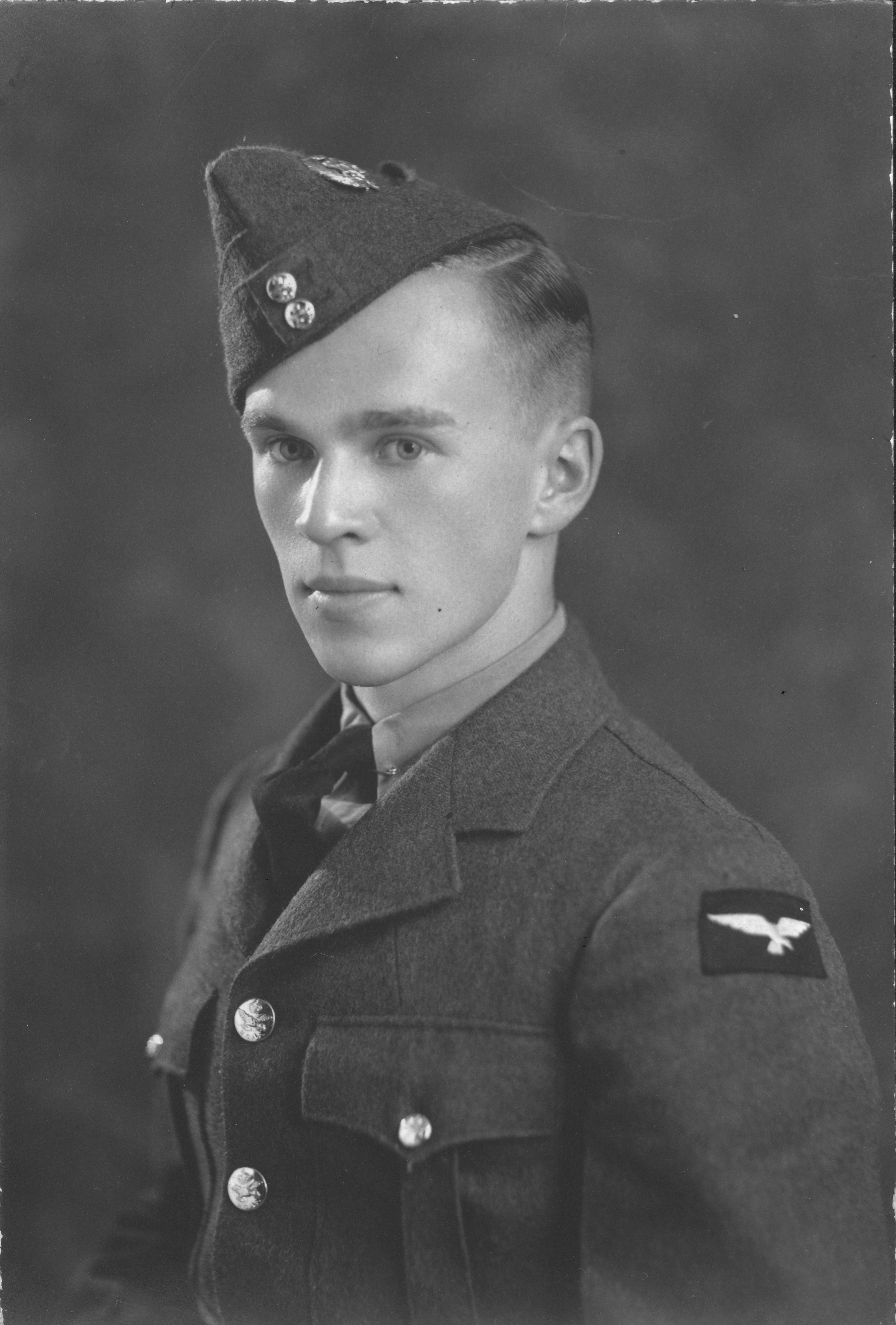
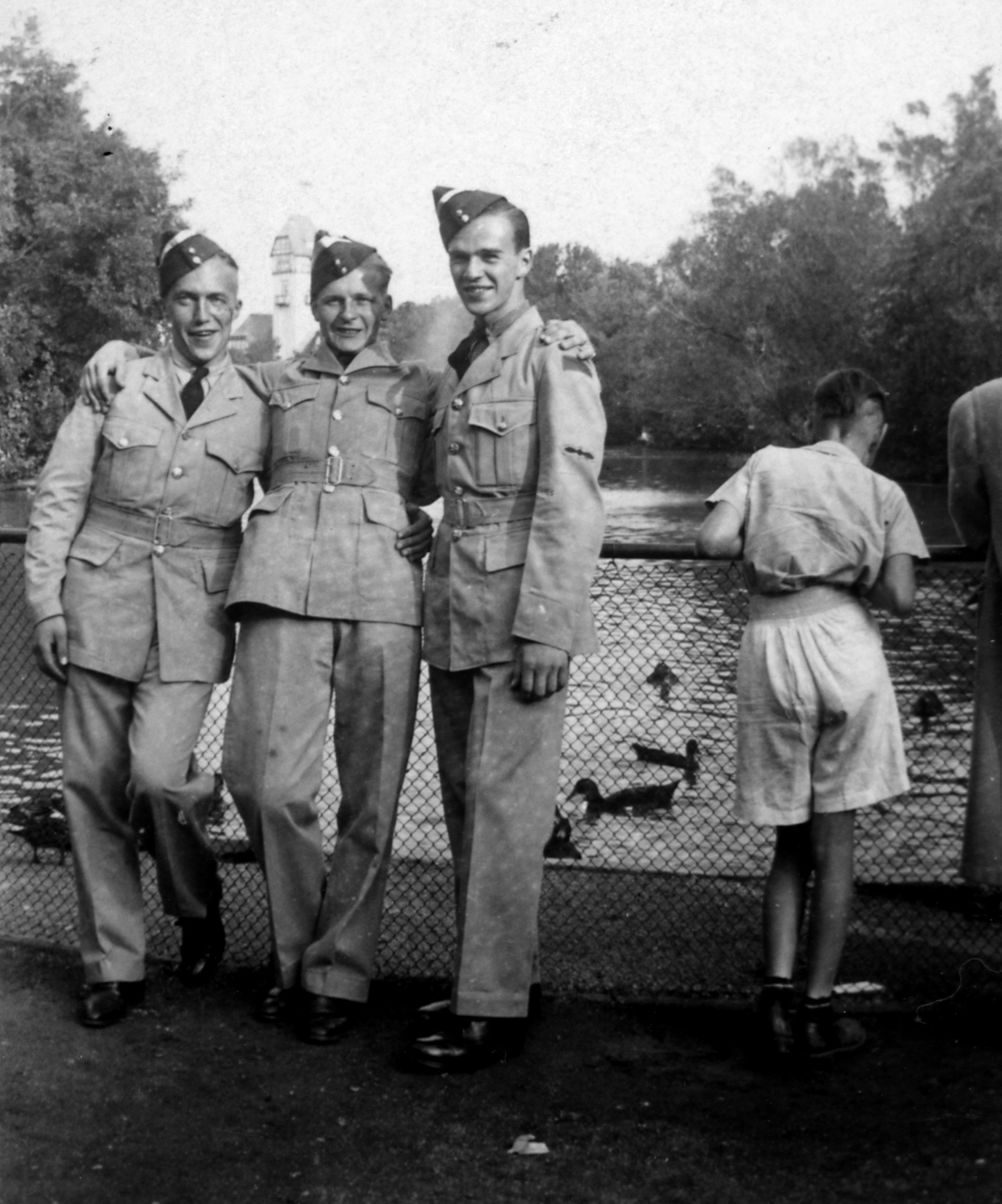
Eric: Uh-huh.
JJ: I don’t think I was 18. Or just bordering on it. I think I had to get my daddy’s permission to go in. Hot to trot. Gordy was part of the Royal Canadian Air Force and Australian Air Force contingent that came to Canada to train—training schools for air duty. We shipped over together. So as a result of him being, uh, a pilot in training at Winnipeg, and I was going in for radio wireless operating, um, we had a very enjoyable affair, and when we got to England, what was exciting about it, to me, particularly, we landed in Scotland, and his home was just outside London, at a little place called Basingstoke.
And, uh, they shipped us to Bournemouth to live. Put us in the apartment hotels there. Had been converted from civilian use to military use. And they were luxurious. I mean, we were treated beautifully.
[J.J. moves in his seat and the lapel mic pops off. Eric reattaches it to J.J.’s shirt.]
Eric: You lost your mic there. It’s like being attached to an IV.
JJ: So, we had, they gave us about 10 days, fortnight, two weeks, we used to call it in those days, to rehabilitate and get settled down. And, uh, I met his parents, he took me to his home for that weekend. But Gordy’s parents, he was a chemalurgist working in the war effort in England. And, uh, his mother and father knew we were expected—we were coming. And she was standing there at the front gate, and she just walked towards me and put out those great big arms of hers, and looked at me, and said, “You’re just exactly what my son described. Welcome home.” I mean, I almost fell through the floor.
Eric: And they knew you were a couple?
JJ: Yeah! That’s why I’m saying, she walked up and said, “You’re everything that Gordy described.” Wow, you know? Here comes my second mother. She was delightful. So at least during the period of the, uh, two years or so we were active duty, we had our own little nest egg place to go to and enjoy ourselves, with the, uh, loving affection of his parents, which was in those days unbelievable.
Think of the setting, we’re talking now in the ‘40s. And, uh, gayville and homosexuality and, uh, even the word homosexuality, which didn’t, uh, historically, from my records didn’t become usable until 1926.
Eric: When were you shot down? What… do you know what date you were shot down? You must remember that date.
JJ: It would be… about August. About the middle of August in ’44.
Eric: ‘44. August of ’44, that’s before the end of the European war. That must have been devastating for you.
JJ: Well, three days in the ocean, you know, cold and wounded and hungry, was a very devastating experience for us.
Eric: And Gordy was dead by then.
JJ: Well, the plane went down, I didn’t know whether anybody had been… See, we all had separate little chutes, and three dinghies were available on the aircraft for the crew, so none of us except for those of us who were in our dinghy… The navigator and the co-pilot and I were together. We had no idea what happened to Gordon and the air gunners. And it wasn’t until we got home, to Blackpool, uh, the hospital, and a couple of days later that I was able to connect with operations at Basingstoke in Hants on the coast where our command headquarters were located in Scotland, to find out if Gordy had survived, and we were the only three that survived. So it was devastating. His parents came to Blackpool to see me, it was unbelievable.
Eric: Did you remain in contact with them years after?
JJ: Oh, sure. I think they, uh, let’s see, Daddy died in ’59, ’60. They died around ’64 or ’65. There’s an awful lot of nostalgia there. I guess I’m lucky to be here. I think out of the whole squadron of about 70 of us that shipped out from Canada, I think maybe today there’s about five or six of us alive.
To me, in recollection, the real shock of losing Gordon was unbelievable. Because we were near the coast, uh, we think, uh, that he… They all bailed out. We all saw… We could see the chutes. It was, uh, mid-… sort of, coming into evening. We think.
Eric: Where were you flying over?
JJ: Over, we were just crossing the coast over France, to go on a mission into Germany. And, uh, I think they shot him down, which was, uh, a habit the, uh, enemy had at that time, shooting our people in parachutes. So we think that’s what happened. We’re pretty sure because we landed off the coast into the ocean. So we have a hunch that the other crew members were over land.
Eric: Over land, and then they were killed.
JJ: Yeah. There’s no record of the plane, nothing. I mean, just missing in action.
Eric: So you were in Vancouver then, on V-J Day, by yourself?
JJ: All my, uh, family were there, and, uh, and, uh, acquaintances.
Eric: Were they aware of your loss?
JJ: My father was aware. Mother… There’s a little, there’s a 64-acre park in the heart of Vancouver City, which is delightful, sort of like Seattle, Washington, Lake Union. So we were walking and went to the the music bowl, and had lunch. Out of nowhere we’re sitting there drinking tea, and Mom looked at me and said, uh, “You must miss Gordon an awful lot.” I mean, I almost fell off the chair. It’s the first time that… and as Daddy prophetically said, “When mother’s ready she’ll discuss it with you.” And bingo, right in there. I loved it.
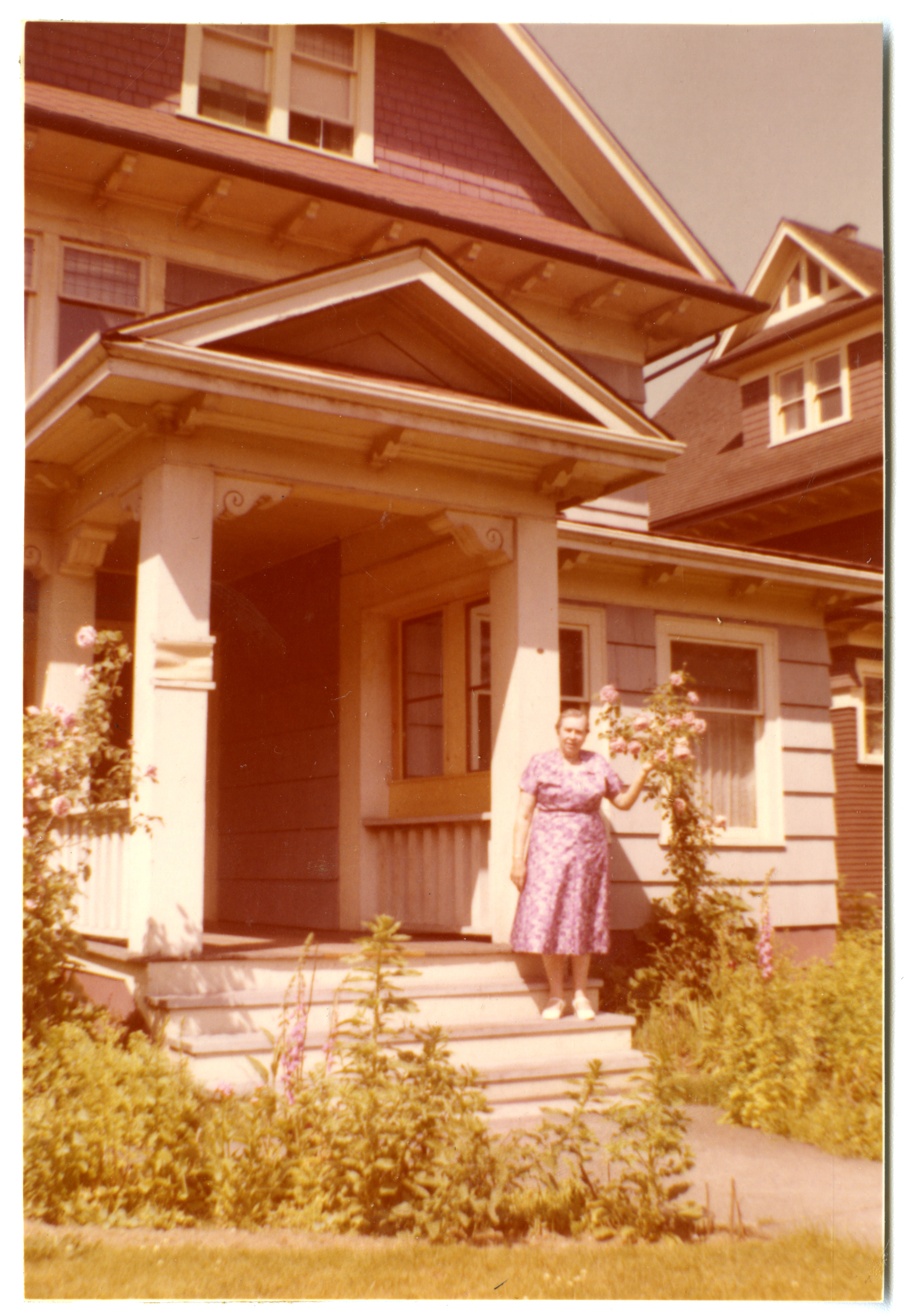
So in that sense, in terms of my orientation, I’ve had a very, uh, understanding and good, enjoyable background. I’ve never had those pressures of what I did. I’m, I can remember Dad’s only remark to Archie and I was—our principal of schools was gay, and the coach, so we had a hell of a good time, I mean, we really had a very gay basketball team, and hockey team. And McNeil was beautiful. But, uh, Daddy just said, “Remember the professional background of the family.” Mother was a nurse, and he was a doctor-surgeon at the university. So outside of… he said, “Bring ‘em home,” meaning, Archie, and whatever, bring him home. That was the only admonishment I ever got from my father.
Eric: Why the decision to become a sexologist?
JJ: Well, that was a result of my reading and background and my father, I had pre-med.
It was during that period of time I went very heavy into parapsychology. Dr. Rhine and his wife, and, uh, Harry Benjamin, uh, in those days, we were working on, and Kinsey. But I worked with him for two years here on a survey.
Eric: With Alfred Kinsey.
JJ: Yeah. Our dear peter meter. Dr. Prometheus is our favorite name for him.
Eric: For Dr… for, for Alfred Kinsey.
JJ: For Dr. Kinsey, yeah, Alfred. We, uh… He invented what we called a peter meter, for his statistics. And one of the instructions to the, uh, interviewees was, you don’t measure from the bottom, you measure from the top, fellas. This way, because you can’t go any further than the os pubic bone. So we named him Dr. Peter Meter. So what’s down below the root, etc., and the perineum doesn’t count. So he says, “We won’t have any of those a-nine measurements, fellas, you start at the top and move forward.”
Eric: How did you wind up working for Alfred Kinsey? Was this prior to the ’48 report or this was after?
JJ: That was, uh, before and after.
Eric: Uh-huh.
JJ: But Benjamin was out here too, Dr. Harry Benjamin, and he was the one who originated transsexualism, as a result of, uh, what in those days was called “eonism”—cross-dressing, transvestite, drag. Well, he resented the fact that there were many out there, uh, let’s forget about pre-op and post-op transsexualism, which is the, um, pregenital vs. surgery to the post.
Uh, he resented the fact that a lot of men, and still is, it’s mostly men to women, were unable to wear, uh, women’s attire, to cross-dress, even at home or at work without harassment by authorities. And in those days out here, I mean, it was, uh, slam-bang in the slammer, and indecent exposure, and, what was the charge? Cross-dressing was a, was a, uh, misdemeanor.
Eric: Mm-hmm.
JJ: Anyway, Dr. Benjamin, uh, Kinsey introduced me to Benjamin, and my father knew him, so bingo, here I am involved in getting the right of cross-dressers and transvestites to wear women attire. We finally got the police department after two years to agree to give them ID cards. You know, even in pantomime in those days, here in San Francisco, you had to wear a black union-all costume underneath your drag, to even get up on stage.
Eric: What’s a black union…
JJ: A coverall. A black coverall over your body before you put your paraphernalia on. Otherwise you were subject to arrest. You couldn’t get up on stage and pantomime and cross-dress and wear drag. It was against the law.
Dr. Benjamin, he had an office in New York and one out here. He was the pioneer in the right of people to cross-dress, and he was a pioneer in pre- and post-operation services. Uh, which didn’t become reality until years later, like Stanford, and, uh, uh, out in Kansas and Menninger. But he was the pioneer in the creation of the word transsexual. He was a pioneer in getting the right of people to cross-dress.
Eric: Do you recall the release of the Kinsey Report in ’48?
JJ: Oh, I helped, uh, read some of the galleys of that thing. I mean, bits of it. I helped, uh, edit, uh, work we did in San Francisco, and the work was done in Los Angeles.
Eric: Was that report startling, did you think?
JJ: Not to those of us who were involved, it held no surprises, I mean, we probably would have exaggerated it a little bit more. Uh, but it was a real, yeah, at large, socially, professionally, and to professional people, sociologists, psychologists and therapists, it was a mindbender. It was a mindbender.
Eric: And… for what reasons?
JJ: You’ve got a very large percentage of people that aren’t exactly, uh, quote-heterosexual-unquote oriented. The very idea of acceptance of a group of people out there who were engaged in, uh, bisexual, ambisexual, homosexual activities. And the number of them.
I come from humane human rights, I put humane there, humane human rights. I have no regard for civil and legal rights, per se. To me it’s a waste of time and political activism, because they’re only pieces of paper. They can be rescinded and changed by a councilman, a councilwoman, a supervisor, a governor or a president. We have plenty of evidence of that. So I’m saying, if we don’t learn, to me, heterosexual, homosexual, bisexual, ambisexual—these are sex acts, per se. They’re not a lifestyle. What we do in bed, per se, as individuals, is nobody’s business out there. But I’m saying, if we don’t address humane human rights we’re gonna lose the ballgame.
The civil rights and legal rights don’t mean a damn thing, they’re being rescinded bit by bit by bit across the country in the last three years. But people like me who’ve lived it, I don’t need memorabilia, I don’t need historical records, I’m still walking on the planet.
Eric: And you’re retired now. Or are you not retired now?
JJ: Economically, and by virtue of, uh, my economic losses and bankruptcy, and a few problems with alcoholism and tranquilizers, yeah, I’m out of business temporarily. The, my dues and my membership and all the rest of it… I got a call about a week or so, or two weeks ago. “Haven’t you raised that $1,800 back, to get yourself back in the good graces of the society?” I said, “No, I haven’t.”
Eric: Which society is this?
JJ: The APA [American Psychological Association].
Eric: Oh, the American Psychological…
JJ: Well, my license fees, the APA, and they whole bit—that’s $1,800 bucks, so hey. I don’t have a sugar daddy out there to help pay my bills. I’m just surviving. So no, in that sense, I’m not practicing, but I’m as active as I possibly can be, and I do a lot of therapy and speaking, which I don’t charge for. Uh, if, since I love speaking, and, uh, my license fee, that’s four—that’s $450 bucks a year. So here I sit, you know?
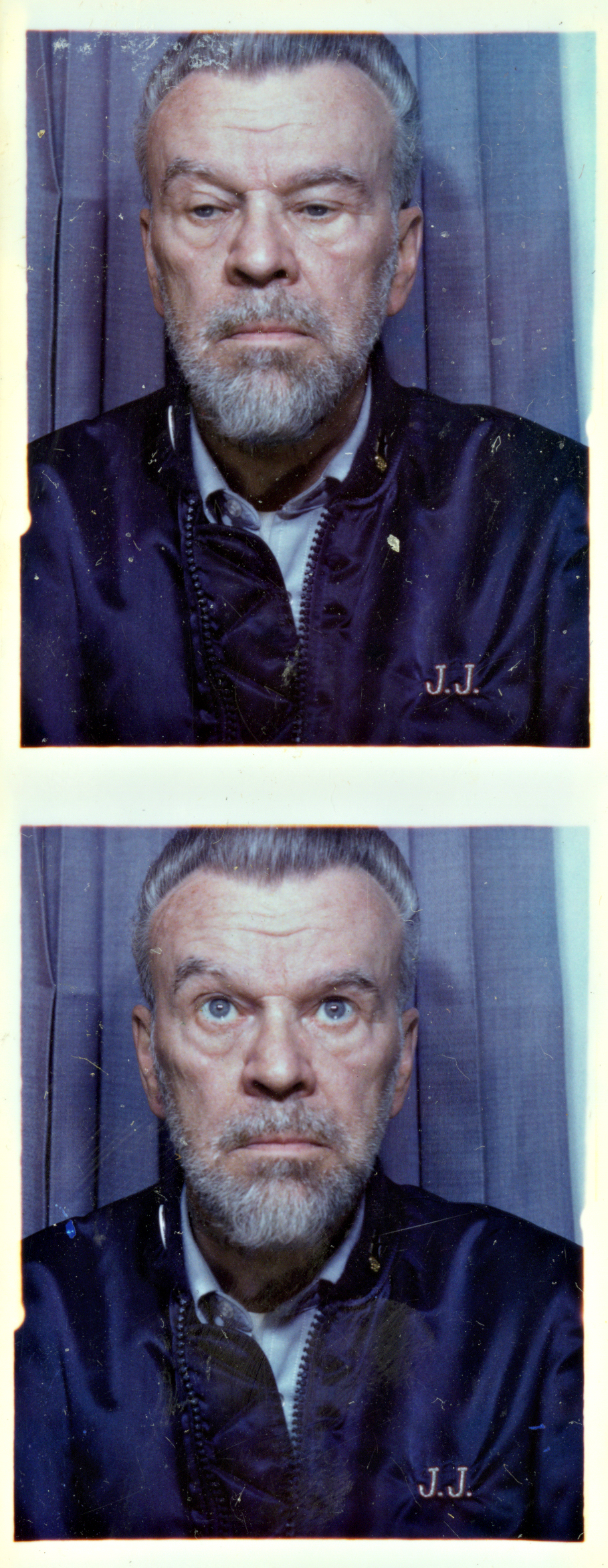
———
J.J. Belanger had a lot to say about a lot of things. He had high ideals and was fond of conspiracy theories. As our conversation rambled on beyond his life in the 1950’s, I could feel the wheels coming off both J.J.’s life and his hold on reality. But that didn’t keep him from collecting valuable archival materials about the movement that he donated to the ONE Archives. That’s where you’ll find the original print of that iconic photo booth kiss. And now you have a voice to go along with that picture… and a whole life that adds up to much more than one photograph.
Joseph John Belanger died on January 26, 1993, two days after his 70th birthday. I couldn’t find a single obituary anywhere and it took some doing to even find out when he died.
———
Making Gay History is a team effort. Thank you to Sara Burningham, our executive producer who makes each episode sing. And thank you to audio engineer, Anne Pope, who makes certain that the episodes sing on key. We had production assistance from Josh Gwynn. Our theme music was composed by Fritz Myers. Thank you, also, to social media strategist Will Coley, our webmaster, Jonathan Dozier-Ezell, and researchers, Bronwen Pardes and Zachary Seltzer. Thank you to our new photo editor, Michael Green, who tracked down a slew of J.J. Belanger photos at the ONE Archives. A very special thank-you to our guardian angel Jenna Weiss-Berman.
The Making Gay History podcast is a co-production of Pineapple Street Media, with assistance from the New York Public Library’s Manuscripts and Archives Division and ONE Archives at the USC Libraries.
Season three of this podcast is made possible with funding from the Ford Foundation, which is on the front lines of social change worldwide.
And if you like what you’ve heard, please subscribe to Making Gay History wherever you get your podcasts. You can also go to makinggayhistory.com. That’s where you’ll find all our episodes, including photographs, notes, and links to additional information about all the people we feature in Making Gay History.
So long! Until next time!
###